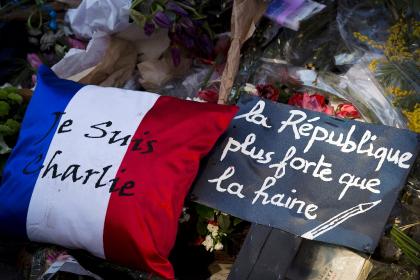Charlie Hebdo responds to terrorist attacks in Paris: ‘We have champagne!’
The satirical magazine’s new cover succinctly celebrates French life while denouncing last week’s tragedy.

Charlie Hebdo is as irreverent as ever.
On Tuesday, the French satirical magazine revealed the cover for its first issue since the terrorist attacks that killed 129 people and wounded hundreds in Paris this past Friday.
The cover for Issue 1217, which is set to hit newsstands on Wednesday, features a man merrily drinking with a bottle in one hand and a glass in the other while champagne pours out of six bullet holes in his torso and legs.
“They have weapons. F*** them. We have the champagne!” the cover reads.
Cartoonist Corinne Rey, who publishes under the pen name Coco, illustrated the cover, continuing a long tradition of bold French satire, which has at times been misunderstood by more sensitive Westerners, who decry its political incorrectness.
After the cover was unveiled, Boer tweeted, “Thank you for all of your messages. We put a lot of ourselves into this issue. We are leaving nothing out. #f--kthem See you tomorrow in #CharlieHebdo.”
The Islamic State terrorist group claimed responsibility for the multipronged attack on Paris, the deadliest on French soil since World War II. Most of the victims were young people who were enjoying a night out at cafés and the Bataclan rock concert hall.
In Wednesday’s issue, the magazine’s managing editor, Riss, called for a renewed debate about Islam, and compared contemporary Parisians to Londoners enduring the Blitz of World War II.
“Blood and tears, prophesied Churchill. That’s where we are,” he wrote. “Without realising it, the Parisians of 2015 have sort of become the Londoners of 1940, determined not to yield, neither to fear nor to resignation, whatever catches them off guard.”
Earlier this year, on January 7, two jihadist brothers forced their way into Charlie Hebdo’s Paris offices, murdering much of the editorial staff. The rampage ultimately resulted in the deaths of 17 people at Charlie Hebdo and elsewhere in Paris.
Apparently, the Islamic extremists, who identified themselves as members of al-Qaida’s branch in Yemen, were offended by the magazine’s depictions of the Prophet Muhammad.
Charlie Hebdo — a far-left-wing secular publication — has mocked all the major religions and caricatured each of its major figures.

In the attack’s aftermath, the phrase “Je suis Charlie (I am Charlie)” became a popular international slogan of support for free speech and a free press, as well as compassion for the people of France.
On January 14, Charlie Hebdo published its first issue after the shooting. Defiantly, it depicted Muhammad holding a “Je suis Charlie” sign. The cover reads, “Tout est pardonné (All is forgiven).”
Roy S. Gutterman, professor of journalism at Syracuse University and director of its Tully Center for Free Speech, noted that the new cover is not as provocative as many of their past.
“They’re picking up where they left off,” Gutterman said in an interview with Yahoo News. “Seems like it’s making a really poignant point about a pretty controversial and tragic event. It’s really what the magazine is all about. Historically, it’s done this.”
The magazine routinely takes shots at public figures who are involved in high-profile and polarizing issues.
“It really strikes a nerve,” Gutterman continued. “When you talk about sensitive issues, like race or religion, one person’s joke is going to be another person’s insult.”
Over the weekend, comic book artist and Charlie Hebdo contributor Joann Sfar posted a controversial illustration on his Instagram page thanking well-wishers from across the globe for using #prayforparis, but suggesting that it might not be the best phrase — considering that the city was attacked by religious zealots.
Sfar responded to readers who he said misunderstood his previous drawing as an attack on their spirituality, and provided a series of illustrations to provide context.
“My point was: terrorists attack France because they hate our French way of life. They hate us because they assume we are not religious people,” he wrote. “That’s why the first answer that came to me was: let’s drink, let’s have sex, let’s celebrate what they hate: life.”
The artist said he welcomes prayer at an intimate level, but does not think “pray” is a suitable hashtag “when people were killed for not praying enough.”
“Forgive me if my cartoons lead to misunderstanding,” Sfar continued. “Of course we welcome any loving thoughts for Paris, whether they are religious or not. I just felt the hashtag ‘pray’ was highly inappropriate.”




